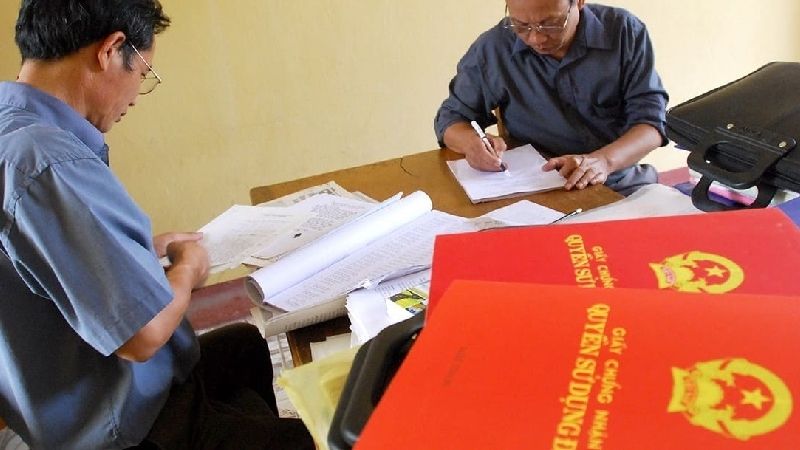What procedures are involved in a real estate transaction, and what are the conditions for a valid sale? Additionally, what are the associated costs? Let’s find out together in the article below!
1 Conditions for Sale and Transfer of Land Use Rights
Conditions for the Transferor
According to Clause 1, Article 188 of the 2013 Land Law, a land user may transfer land use rights if the following conditions are met:
- Possess a certificate of land use rights (except for cases specified in Clause 3, Article 186 and cases of inheritance as stipulated in Clause 1, Article 168 of the 2013 Land Law)
- The land is not subject to any disputes.
- The land use rights are not subject to any enforcement measures for the execution of court judgments.
- The land is within the duration of land use rights.
In certain cases, in addition to the transferor meeting the above conditions, the transferee must also not fall under any prohibition from receiving the transfer.
 Conditions for Sale and Transfer of Land Use Rights
Conditions for Sale and Transfer of Land Use Rights
Conditions for the Transferee
The following individuals are not entitled to receive a transfer of land use rights:
-
Individuals who are foreigners permanently residing in Vietnam, overseas Vietnamese, or foreign-invested enterprises, as well as households, religious organizations, communities, organizations, or individuals of Vietnamese nationality.
-
Economic organizations are not allowed to receive transfers of land used for growing rice or special-use forests, nor land for protective purposes from individuals or households, unless approved by a competent authority.
-
Households or individuals who are not directly engaged in agricultural production are not permitted to receive transfers of land use rights for rice cultivation.
-
Households or individuals who do not reside in the area of protective or special-use forests are not entitled to receive transfers of agricultural land use rights within these forest areas.
2 Procedure for Real Estate Transactions
To ensure compliance with the procedure for real estate transactions, the following steps should be carefully followed:
According to Article 42 of the 2014 Notary Law, the land transfer contract must be notarized at a notary office or notary public office within the province or city where the land to be transferred is located.
 Sample Real Estate Purchase and Sale Contract
Sample Real Estate Purchase and Sale Contract
According to Articles 40 and 41 of the 2014 Notary Law, the following documents must be prepared:
For the Transferor:
- Certificate of land use rights.
- Household registration book.
- Copy of ID card, citizen identification card, or passport.
- Marriage registration or marital status certificate.
- If the transferor is authorized to transfer the land, a power of attorney is required.
For the Transferee:
- Household registration book.
- Copy of ID card, citizen identification card, or passport.
- Marriage registration or marital status certificate.
The transferring individual is responsible for declaring their financial obligations by paying the registration fee and personal income tax, unless they are exempt as stipulated in Clause a.1, Point a, Clause 3, Article 16 of Circular No. 156/2013/TT-BTC and Clause 1, Article 10 of Decree No. 140/2016/ND-CP.
 The transfer of the Red Book is extremely important
The transfer of the Red Book is extremely important
According to Articles 40 and 41 of the 2014 Notary Law, the following documents must be prepared:
For the Transferor of the Real Estate:
- Red Book, household registration book.
- ID card or citizen identification card.
- Marriage certificate or marital status certificate.
- Power of attorney (in case the transferor is authorized to transfer the land).
For the Transferee of the Real Estate:
- Household registration book.
- ID card or citizen identification card.
- Marriage certificate or marital status certificate.
After preparing the necessary documents and paying the required fees, the dossier should be submitted to the district-level branch of the Land Registration Office, where the land to be transferred is located.
3 Frequently Asked Questions about Real Estate Transaction Procedures
Can Land under Planning be Transferred?
To determine if a plot of land is subject to planning, the following methods can be employed:
- Review the land use planning directly at the People’s Committee of the district or commune level.
- Access the online portal of the district-level People’s Committee.
- Consult with the commune-level land official or local residents in the area where the land is located for additional information.
- Obtain information from the Land Registration Office.
According to Article 49 of the 2013 Land Law, as amended and supplemented by the Law Amending and Supplementing a Number of Articles of 37 Laws Related to Planning in 2018, if the land use planning has been announced but there is no annual land use plan at the district level, the land user may continue to use the land and exercise the rights of the land user in accordance with the law.
In the case of an annual land use plan at the district level, the land user in the area (where land use purpose conversion and land recovery are required according to the plan) may continue to exercise the rights of the land user but may not construct new houses, works, or plant perennial crops. If the land user has a need for renovation or repair of existing houses or works, they must obtain permission from the competent state agency in accordance with the law.
 Land under Planning
Land under Planning
Based on the above provisions, if the land use planning has been announced but there is no annual land use plan at the district level, or if there is an annual land use plan at the district level, the land user in the area who is subject to land use purpose conversion and land recovery according to the plan may continue to exercise the rights of the land user, including the right to transfer, mortgage, and contribute capital with land use rights as stipulated in Article 167 of the 2013 Land Law.
In summary, land under planning can still be transferred, provided that the following conditions specified in Clause 1, Article 188 of the 2013 Land Law are met:
- Possess a certificate of land use rights, except for cases specified in Clause 3, Article 186 and cases of inheritance as stipulated in Clause 1, Article 168 of the 2013 Land Law.
- The land is not subject to any disputes.
- The land use rights are not subject to any enforcement measures for the execution of court judgments.
- The land is within the duration of land use rights.
If the land under planning meets the conditions for transfer, the transfer procedure is similar to that of a typical land use rights transfer. First, both parties must go to a notary office to create a land use rights transfer contract and have it notarized.
Next, the financial obligations must be declared at the Land Registration Office. Following this, the dossier for the change of name must be submitted. Finally, both parties pay the required fees and receive the Red Book, thus completing the process.
What is the Notarization Procedure for Real Estate Transactions?
According to Clause 1, Article 40 and Article 41 of the 2014 Notary Law, the parties must prepare a dossier consisting of the following documents:
For the Seller:
- Certificate of land use rights.
- Personal identification documents: ID card/citizen identification card/passport (for both husband and wife).
- Household registration book.
- Marriage certificate or document certifying marital status.
- Power of attorney (if someone else is authorized to transfer the land).
 Preparing the dossier when going to the notary public for real estate transaction procedures
Preparing the dossier when going to the notary public for real estate transaction procedures
For the Buyer:
- Personal identification documents: valid ID card/citizen identification card/passport.
- Household registration book.
- Marriage certificate or document certifying marital status.
One of the two parties should prepare:
- Request for notarization, usually prepared by the buyer according to the template of the notary practice organization, unless otherwise agreed. According to regulations, the party requesting notarization is responsible for paying the notarization fee, unless otherwise agreed by the parties.
- In addition to the above documents, the parties may draft the contract themselves. However, typically, the contract is prepared by the notary organization.
Reference:
What to Consider when Buying Real Estate without a Red Book?
 Before signing a land purchase contract, the buyer should thoroughly research the land and the seller
Before signing a land purchase contract, the buyer should thoroughly research the land and the seller
If you choose to purchase real estate without a Red Book, the following considerations should be kept in mind:
- A deposit contract should be made, clearly stating the commitments and compensation in case the seller fails to fulfill their commitments. It is advisable to have a power of attorney for management and disposition to prevent the seller from failing to fulfill their commitments.
- Thoroughly research the land to ensure there are no disputes or planning issues.
- Request the seller to provide the original land documents.
- The sales documents and land transfer contract should include the witness’s signature and the seller’s fingerprint of the right index finger.
What is the Difference between Land Plots and Residential Land?
| Characteristic | Land Plot | Residential Land |
| Definition | Land plots are part of the investor’s planning and have not been constructed. Land plots are often used for residential areas, eco-tourism areas, or buildings. | Residential land belongs to the group of non-agricultural land, including rural and urban residential land. It is used for building houses and works to serve life. |
| Legal Entity | Enterprise/ Investor | Individual |
| Time to Issue the Sub-Book after Plot Subdivision | 1 – 2 years | 2 – 6 months |
| Possibility of Further Subdivision | Land plots that have been planned in detail at a scale of 1/500 cannot be further subdivided. | Depends on the minimum area of the land plot |
| Infrastructure | Land plots have a synchronous infrastructure system, including roads, bridges, etc. For land plots used for residential areas, security and fire protection are given special attention. | The infrastructure, transportation system, utilities, and security depend on the location of the land. |
Notes on Real Estate Transactions involving Land Plots and Residential Land:
- When buying residential land, it is essential to research the land thoroughly to avoid disputes or planning issues.
- When buying land plots, it is crucial to verify the project’s legal status and ensure transparent contracts and documents.
Reference:
The Ultimate Guide to Transferring Land Titles in 2023: A Comprehensive Step-by-Step
The process of transferring land use rights and red book ownership can be complex and daunting. Our comprehensive guide will take you through the intricate details of this procedure, ensuring a seamless and stress-free experience. Discover the ins and outs of preparing the necessary documents, navigating the intricate steps, and understanding the associated costs. Empower yourself with knowledge and streamline the transfer of your red book with ease.



































